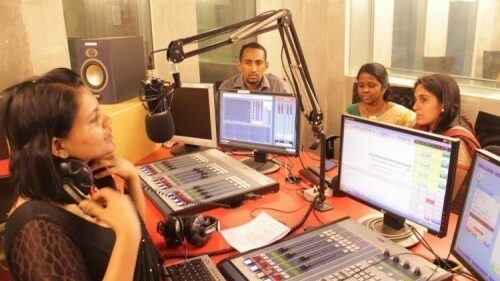Local Radio Station Recognizes IJM Women in Leadership
Violence Against Women & Children
Recognizing March as a month to celebrate women, a Chennai radio station recently hosted IJM Chennai’s Directors of Casework and Communications. The only English-speaking radio station, Chennai Live 104.8 covers the entire city—a population of approximately 4.8 million.
Director of Casework Alice Suganya has worked for IJM for 11 years and Director of Communications Remya Abraham joined IJM in 2013. Both Alice and Remya have a direct impact on IJM’s work; Alice oversees the three casework departments: documentation /evidence collection, legal and aftercare. Remya leads the regional communications strategy, coordinating with the five South Asia offices.
IJM asked these two strong women to share their stories of leadership and offer advice to other women seeking to be community leaders in the following Q&A.
Q: When did you first decide to pursue a role in empowering others?
ALICE: When I joined IJM, I learned more about violence against the poor, particularly on the issue of bonded labor. The more I heard and saw the work affecting people’s lives, the more I felt God’s calling for this special task. I was happy to get involved in this work because it’s God’s desire to seek justice.
REMYA: I remember hearing of IJM while I was working for another organization. A colleague’s wife and sister were working for IJM and had been on a rescue. They were nearly killed as a mob gathered around the vehicle and sought to set it alight. I was shocked. I’d heard of bonded labor before, but it seemed impossible that people could face such injustice in the 21st century! And it was happening to someone I knew, so this was for real! I remember repeating to myself over and over again, “They are willing to kill for it.” It was a turning point for me as an idealistic young adult who had lived a rather shielded life. Ever since that day, almost 10 years ago, I wanted to be fighting injustice.
Q: What encouragement would you offer to other women seeking to be leaders in their communities?
ALICE: (1) Don’t ever give up. (2) Stand firm in what you believe. There is always hope even though you experience setbacks. (3) Be aware of your abilities and know your potential.
REMYA: Generally, we have preconceived ideas of ‘leaders’—we have mental images that have been created mostly by the mass media. Every woman who makes the best use of her available resources despite her circumstances is a leader. Look at Gowri and Vasanthi; they aren’t educated, they have never been to school, or been taught public speaking and yet they have used their limited resources and risen above their circumstances to inspire scores of others.
Q: What challenges might women have to overcome within leadership roles?
ALICE: Culturally, women in India can experience struggles being a female leader as leadership is more often associated with men. Besides this, as women we also have more family responsibilities and duties. Sometimes, I wish I could spend more time with my son. Finding a balance between personal life and work is difficult.
REMYA: There is a common perception in India that Indian men do not respond well to women bosses. While that may be true in other organizations, I don’t think that holds true at IJM. Based on my overall experience though, I’d say a woman has to work twice as hard to hold her own against a male peer. That’s because the expectations from a man on the home front are substantially less. However, as a woman, you are juggling roles and expectations. Most women constantly find themselves faced with the task of serving two equally demanding masters—home and work, and having to constantly cut back on one or the other.
Q: What are the greatest moments of joy within your work?
ALICE: Seeing people freed from bondage, being rehabilitated and living their lives in dignity is the greatest joy!
REMYA: The cause itself gives me a deep sense of fulfilment. I am humbled to be considered worthy enough to be a spokesperson for the poor. Also, working with passionate co-workers is joy; people here work as much with their hearts as with their heads, and the enthusiasm, energy and passion are infectious! Every other day there are little things to celebrate—a long pending judgment FINALLY coming through, a perpetrator arrested, a survivor doing amazing things, a story being featured by a major media house. We celebrate it all because every small victory is one step closer to our final goal—ending bonded labor.
Join Alice and Remya in empowering the vulnerable by becoming a Freedom Partner.